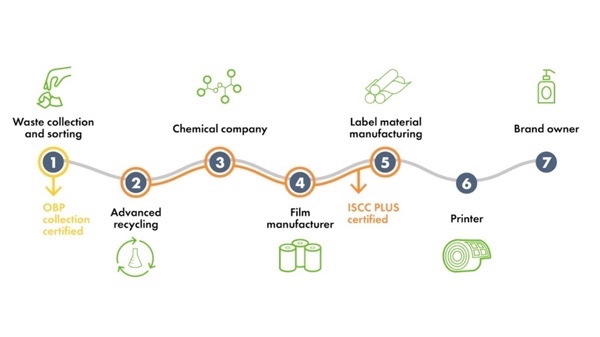Consumables
UPM Raflatac is the first company in the world to launch a certified labelstock

Tuesday 21. June 2022 - UPM Raflatac is the first company in the world to invest in Ocean Bound Plastic (OBP) as a label raw material for its new Ocean Action labels. The use of Ocean Bound Plastic for the Ocean Action labels is based on a mass balance approach.
Ocean Bound Plastic is plastic waste from areas up to 50 km inland from waterways and thus defined by the OBPCert certification programme as “potential waste that may enter the sea”. This new innovative label material is made possible through close collaboration with several partners along the product’s value chain.
The world urgently needs more sustainable and economically viable options for recycling end-of-life plastics. The United Nations has recognised this need and has launched a new agreement against plastic pollution for 2021. OBPCert estimates that 80% of plastic waste in the oceans is due to Ocean Bound Plastic. Today, only about 10% of plastic waste worldwide is recycled, the rest ends up in landfills, incinerators or ends up in nature or the oceans. One solution to this problem lies in making products made from these materials attractive to the market.
“The new innovative Ocean Action label material is another step in our journey to eliminate the use of fossil raw materials. It helps prevent plastic waste from ending up in the ocean and also helps brand owners meet their targets of higher recycled content in their own packaging. Ocean Action labels are an easy-to-use drop-in solution designed specifically for food and cosmetics, offering exactly the same performance as conventional fossil-based labels,” says Eliisa Laurikainen, Business Development Manager at UPM Raflatac.
The Ocean Action labelstock is available as white and clear surface-coated PP film with RP37, RF37 and RP74 adhesives in combination with PET 23 PCR and Glassine substrates. These label materials are perfect for everyday consumer goods (FMCG) such as household goods, personal care products, packaged food and beverages.
To make Ocean Action labels a commercially successful product as well, UPM Raflatac works closely with several partners. The collaboration is necessary to get a real circular economy going. As a first step, HHI, a Malaysian-based plastics recycling company, collects and sorts accumulated Ocean Bound Plastic with its partners. HHI holds Ocean Bound Plastics certification under the Zero Plastic Oceans programme, which ensures the responsible sourcing, proper collection and handling of this particular plastic waste.
After collecting and sorting the plastic waste, HHI converts the waste into pyrolysis oil through chemical recycling. The pyrolysis oil is then used by the chemical company SABIC to produce high quality PP plastic pellets.
“We are proud to offer our customers another truly sustainable alternative for waste that might otherwise end up in the ocean or rivers through the advanced recycling of end-of-life plastic. Labels containing Ocean Bound Plastic are part of our TRUCIRCLE circular solutions programme, which aims to help reduce plastic waste, reduce further use of fossil resources and protect our planet,” says Lada Kurelec, General Manager PP, PET, PS, PVC, PU & Elastomers Businesses for Petrochemicals SABIC.
In the next step, the finished plastic granulate will be used by film producer Taghleef Industries to produce the film that will be used by UPM Raflatac to make the final label material.
“We are proud to be part of this initiative, which is another step towards the circular economy thanks to the efficient recycling of valuable material and is a responsible attempt to preserve our environment, especially for younger generations,” says Simone Baldin, Business Unit Manager – Labels Europe, Taghleef Industries.
The plastic waste used to produce the Ocean Action labelstock is certified under the Zero Plastics Oceans programme and the finished labelstock is certified under ISCC PLUS. Sustainable recycled raw materials are used for the label material, saving the equivalent amount of new fossil resources. The mass balance approach used in this process ensures that the appropriate amount of sustainable resources are used. It also verifies that Ocean Action labels are transparently traceable and sustainably sourced.
